Popular games for platform Nintendo Entertainment System

Jurassic Park is a top-down action-adventure game based on the blockbuster film. Players take on the role of Dr. Alan Grant, exploring the island, rescuing stranded workers, and battling escaped dinosaurs. The game features maze-like levels, limited ammo, and key-based progression, combining exploration and survival in a challenging prehistoric setting.
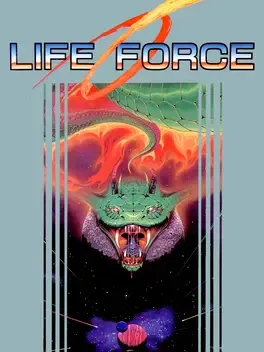
Life Force is an action-packed shooter where there are six levels which alternate between side and vertical scrolling, each of them ending with a powerful guardian. Throughout the game, destroying certain enemies will release power ups which can be used to equip your ship with more powerful weapons, extra speed, and shields. Gameplay is for one player or two players simultaneously.
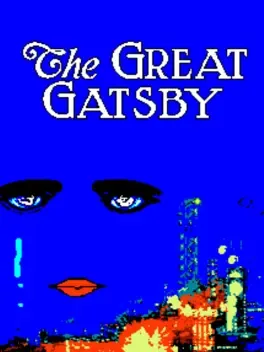
The Great Gatsby is a platform game inspired by the 1925 novel of the same name by F. Scott Fitzgerald. Loosely borrowing characters and locations from the original story, players guide Nick Carraway through four main levels. The game is jokingly said to be a localized, unreleased port of the Japanese NES game Doki Doki Toshokan: Gatsby no Monogatari and the developers even made up fake advertisements, credits and a cartridge photo. It is however an entirely original browser game created to resemble a NES platformer from the 8-bit era.
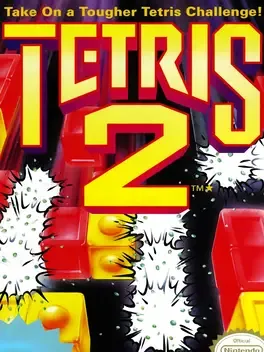
Unlike the original Tetris, Tetris 2 has you clearing the field of blocks in a different way. Each play field starts with different colored dots (in this case black, gray and white), with one of each color flashing. The blocks are made up of the same three colors, and by matching blocks of the same color over the top or to the side of the dot will clear the dot and those blocks from the screen. If you clear a flashing dot, all the corresponding dots of the same color will be cleared. To complete the round just clear the dots, not the blocks themselves.
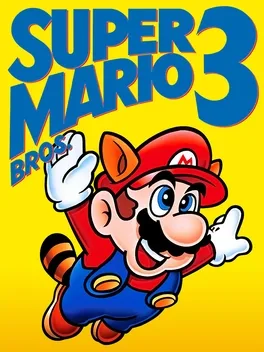
Super Mario Bros. 3, the third entry in the Super Mario Bros. series and Super Mario franchise, sees Mario or Luigi navigate a nonlinear world map containing platforming levels and optional minigames and challenges. The game features more diverse movement options and new items alongside more complex level designs and boss battles.

Clash at Demonhead is an open-ended platformer. The player takes control of Billy "Big Bang" Blitz, who is capable of running, jumping, and shooting. He is initially armed with a handgun, though various upgrades can be purchased from a shop. He later gains the ability to perform various powers by collecting Force, including shrinking, teleportation to previously-visited areas, flight, healing, and invincibility. The player chooses levels from a world map that consists of over forty routes. Various objectives must be met to complete the game.
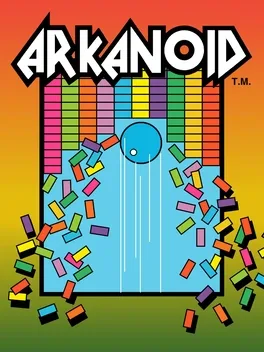
NES port of Arkanoid. The original Breakout concept involves controlling a bat at the bottom of the screen and using it to catch and direct a ball so as to hit all the bricks which are arranged at the top of the screen. It was unpopular for over a decade, before Taito revived it with some new ideas in this arcade game. The game's plot redefines the bat as a Vaus spaceship, the ball as an energy bolt, and the bricks form a mysterious wall stopping the ship from progressing to safety. By the mid-80s, power-ups were popular in most types of arcade games, and Arkanoid features them. They are caught by positioning the bat below them as they fall (meaning that you risk missing the ball if you go for them at the wrong time). The power-ups include lasers (which are mounted to each side of the ship and allow you to shoot out the blocks), a catching device (so as to be able to fire the ball off at a different angle every time you hit it) and one that slows the bolt down.
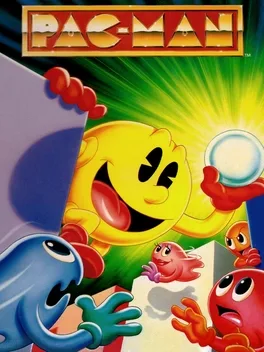
The NES port of the arcade classic.
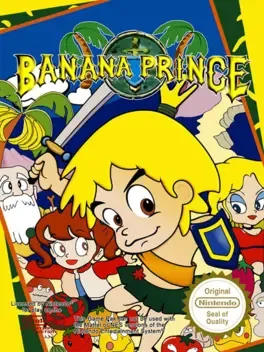
Banana Prince was developed by KID and released in Japan by Takara on December 20, 1991. It was also released in Germany in February 1992, with slightly different graphics and gameshow questions based on the region. It is a single player platform game designed for the Nintendo Entertainment System.
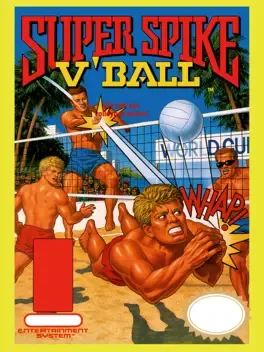
Warm up with a few exercise games then face contenders in the American Circuit. For the ultimate challenge play against the best in the World Cup. Jump and block opponent's spikes, dive to dig a cross court spike, or set one up for a smash that only the best player can return. Kabooom! Your Super Spike blasts your opponent off his feet! "X" marks the spot so you can track the ball. Pick players with speed, strong defense, or killer offense. Your quick reflexes and competitive spirit complete the team. Play against the computer, by yourself or challenge a friend. With the NES Satellite or the NES Four Score any combination of one to four can play - even two vs. two! Now you can play on sand courts from Daytona to Los Angeles. Face off international teams in Hawaii or challenge the hot Navy team aboard an aircraft carrier. Watch the sand fly! Hear the applause. Soak up the rays! It's Super Spike V'Ball for World Class fun!
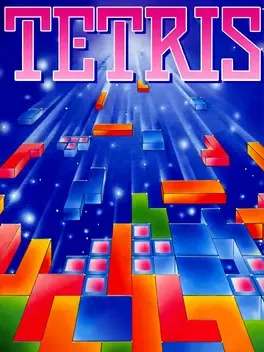
Tetris is a tile-matching puzzle video game. The goal is to place pieces made up of four tiles in a ten-by-twenty well, organizing them into complete rows, which then disappear. There are two game modes: A-Type and B-Type. A-Type is an endless marathon with increasing speed levels. B-Type is played at a fixed speed, with or without optional garbage blocks in the playfield, and a goal of clearing 25 lines.
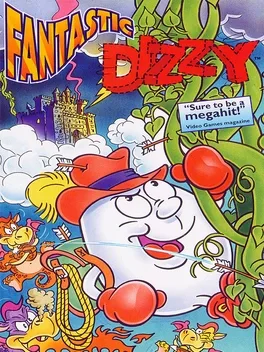
Dizzy is an egg living in a world of magic and fantasy. The basic concept of the game is to move around the world, finding various items and collectibles, and to use them in the right locations. Dizzy has no special skills or abilities, save for his remarkable feats of somersaulting, and must solve all problems he faces with the clever use of one or more items.
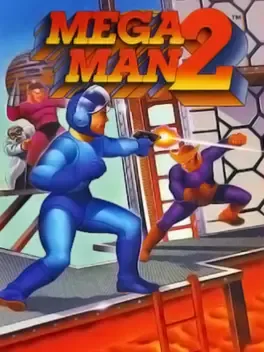
In the year 200X, a super robot named Mega Man was created. Dr. Light created Mega Man to stop the evil desires of Dr. Wily. However, after his defeat, Dr. Wily created eight of his own robots to counter Mega Man.
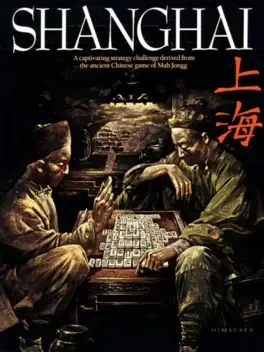
Shanghai is a computerized version of mahjong solitaire. After winning a game, the tiles reveal the three-dimensional blinking eye of a dragon behind the game screen. The Macintosh and Sega Master System version shows an animated dragon spitting fire.
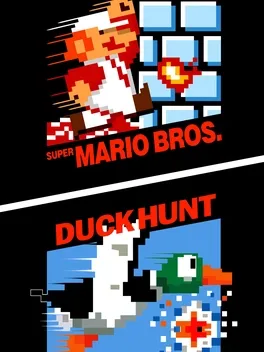
A compilation of Duck Hunt and Super Mario Bros. Duck Hunt featured a lightgun shooting game while Super Mario Bros. is a well-known platformer.
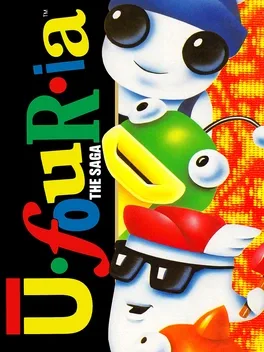
This game is set in a free-roaming environment. The game's world comprises interconnected areas which consist of outdoor sections, caves, water, and other thematic places with platform structures and wandering enemies. Similarly to The Dragon's Trap, the player is theoretically able to explore this world from the beginning; however, many areas are too hazardous or impossible to traverse when the player controls only one character with his limited abilities. This European version of the game has some alterations when compared with the original Japanese release such as a different story, characters' names and sprites being changed, and bird enemies dropping weights instead of feces.
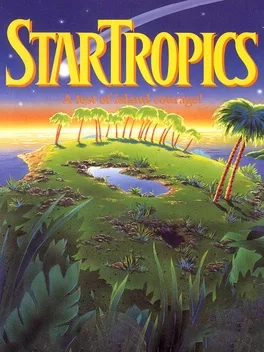
Find out just how resourceful you can be in this classic game, with its mixture of adventure and RPG elements. Step into the shoes of Mike Jones, a teenage star pitcher from Seattle who has come to the tropics to visit his famous archeologist uncle, Dr. Jones. After being told that his uncle has been abducted, Mike begins a perilous quest in order to rescue him and figure out the mysterious plot behind his disappearance.
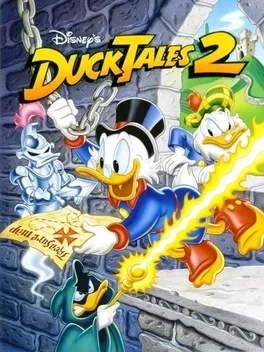
Scrooge McDuck is hot on the trail of the richest adventure ever. Pieces to the map of the Lost Treasure of McDuck have been scattered across the globe, and Scrooge must find them before the greedy Flintheart Glomgold grabs them. It's going to be a race to the finish as both of them try to find the treasure and become the richest duck in the world! Join Scrooge and his nephews as they explore the ancient pyramids of Egypt and do battle with swash-buckling pirates in the Bermuda Triangle. Help them search the haunted halls of an ancient Scottish castle and scale the watery heights of Niagara Falls. Aid Scrooge in his quest for the secret of the island of Mu and you'll gain the final clue to unravel the hidden location of the Lost Treasure of McDuck!
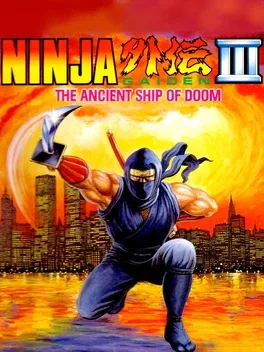
Thrilling new cinema screen! Follow the story of Ryu's epic adventure through Tecmo's movie-like Cinema Screen Animation. As you complete each level, a new part of the story unfolds. Exciting new powers and weapons! Over the years Ninja Ryu's fighting skills have improved to include fantastic new powers and weapons. Action-packed Ninja adventure! Can you get Ryu through his most challenging adventure as he battles the hideous ancient forces of darkness to save mankind? The Ultimate Ninja Challenge!
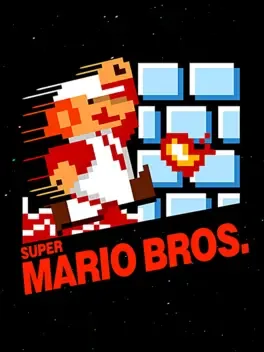
A side scrolling 2D platformer and first entry in the Super Mario franchise, Super Mario Bros. follows Italian plumber Mario as he treks across many levels of platforming challenges featuring hostile enemies to rescue Princess Peach from the evil king Bowser.
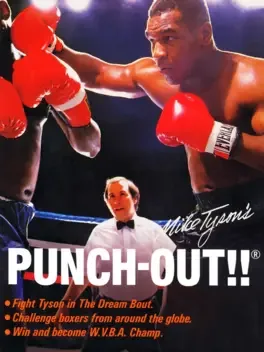
Punch-Out!!, originally released in North America as Mike Tyson's Punch-Out!!, is a boxing sports fighting video game for the Nintendo Entertainment System (NES) developed and published by Nintendo in 1987. Part of the Punch-Out!! series, it is a port of both the Punch-Out!! and Super Punch-Out!! arcade games (particularly the latter) with some variations. Punch-Out!! features a boxer known as Little Mac working his way up the professional boxing circuits, facing a series of colorful, fictional boxers, leading to a final fight with real-life boxer, the then-World Heavyweight Champion, which is Mike Tyson in the original version and Mr. Dream in the later version. Little Mac has a limited repertoire compared to most of his opponents. His punches are limited to left and right jabs, left and right body blows, and a powerful uppercut. The uppercut can only be used once the player earns a star, which is typically accomplished by counter-punching the opponent directly before or after certain attacks are launched. The player can acquire up to three stars. To perform the uppercut, the player needs to press the start button once a star is earned. To defend, Mac can dodge left or right, duck, and block punches by putting up his guard. Little Mac also has a heart meter, which decreases by three upon being struck by an opponent and one upon blocking an attack or an opponent blocking/dodging the player's attack. When the heart meter decreases to zero, Little Mac temporarily turns pink and appears exhausted, leaving the player unable to attack but still able to dodge or block. At this point, Mac can regain some hearts (and his normal color palette) only by avoiding the opponent's punches. He immediately loses all of his hearts upon being knocked down, but can regain some by getting up. A bout can end by knockout (KO), if a fighter is unable to get up within ten seconds after being knocked down; by technical knockout (TKO), if a fighter is knocked down three times in one round; or by decision, if the bout lasts three full rounds without a clear winner. In order to win by decision, the player must accumulate higher than a certain point total by punching the opponent and/or knocking him down (different boxers require different point totals to win by decision). However, some bouts cannot be won in this manner and will automatically result in a loss for the player if the opponent is not knocked out. Mac can only get up three times during any one bout; if he is knocked down a fourth time, he will be unable to rise and thus lose by knockout. When Mac loses his first bout to a ranked opponent, he will have a chance to fight a rematch. However, if he loses a Title Bout, he will fall in the rankings - one place for the Minor or Major Circuits, two places for the World Circuit. Losing a rematch causes him to fall one place (unless he is already at the bottom of his circuit), forcing him to fight his way back up. A third loss (not necessarily a consecutive one) ends the game. The exception is the final fight against Mike Tyson/Mr. Dream; a loss to them automatically results in a game over.
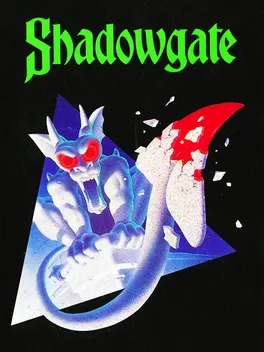
Thrust into the role of "The Seed of Prophecy," players travel deep into the living castle, in hopes of defeating the evil that dwells within – the dreaded Warlock Lord.
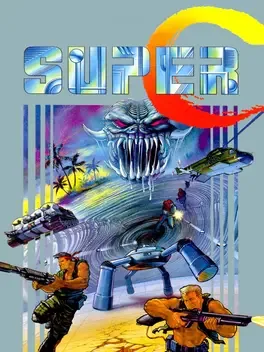
The alien Red Falcon is back, and planning on taking over the planet Earth.
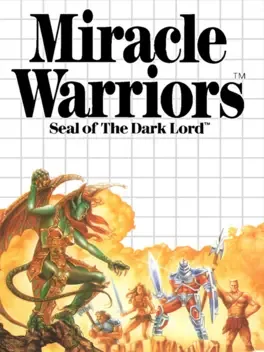
Japanese RPG. Two editions exist, one for the MSX1 on cartridge, and one for the MSX2 on 3.5" diskette. The seal of the Dark Lord Terarin has been broken and Terarin has been unleashed into the world again. She has stolen the Golden Seal and opened pandora's box, unleashing evil creatures into the world. A young hero is tasked by a king to stop Terarin. He must step into footsteps of Iason, a shepherd that once accidentally unleashed Terarin and fought to seal the Dark Lord again. The hero must enlist the aid of three companions, Guy the warrior, Medi the amazon and Treo the pirate (called Turo in the manual) and find the three keys to Terarin's lair. To face the Dark Lord, they must find the mystical weapons and armor of old and then defeat Terarin and seal the Dark Lord from the world.